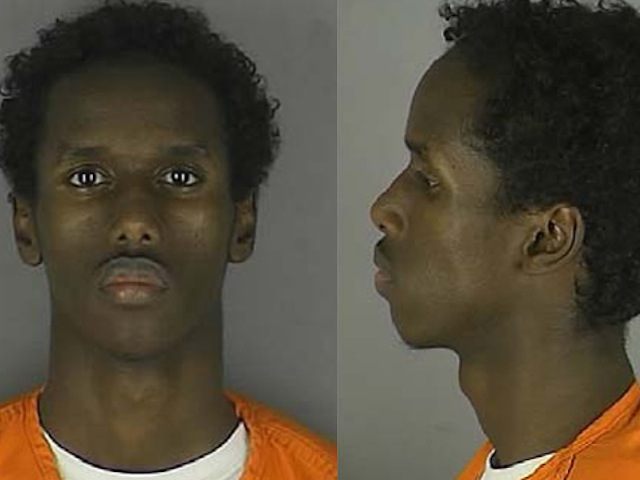The family of accused ISIS recruit Guled Omar, a 21-year-old resident of Minneapolis, has complained that he is confined under “inhumane” conditions that may cause him to “suffer mentally.”
According to the Minneapolis Star-Tribune, Omar’s mother Fadumo Hussein claims to have been “repeatedly turned away” when attempting to visit him as several different jails in the area. She said he told her over the phone that he was “living under harsh conditions in the Ramsey County jail and that he was suffering from several ailments because his cell was kept so cold.”
“My child never stole anything, he did not kill anybody, he did not rape anybody, he did not burglarize any place,” said Hussein. “How can it be possible that he could be looking at spending the rest of his life in jail?”
The family claims to have accumulated a $300 phone bill from such telephone conversations. Later in the article, it is stated that they communicate with Omar using video chat services.
Omar’s family also complained that he is held in solitary confinement, with only one hour a day to shower or conduct those video chats with his family. His attorney Glenn Bruder, who said he is not being given sufficient visitation time with his client to prepare a defense, added that Omar “does not have access to a canteen to purchase food or toiletries nor is he allowed to use vending machines.”
Bruder described Omar as “depressed” and despairing over “how he can make it five months in these conditions.” The attorney has written to U.S. District Court Judge Michael Davis to describe Omar’s condition, and ask that he be transferred to a different jail.
Bruder told the Star-Tribune he found his client’s pretrial detention highly unusual, unless “you’re John Gotti sitting in a federal max prison.”
The U.S. Marshals Service responded by saying Omar would have a “target on his back” if allowed to mix with the general prisoner population, and was kept in solitary confinement at the request of the FBI, which refused to comment for the Star-Tribune’s story.
As to the charges against Omar, the Star-Tribune describes him as one of a dozen men charged with participating in a conspiracy to aid the Islamic State, with several other conspirators from the Minneapolis area slipping out of the United States to fight for ISIS in Syria and Iraq. The authorities believe some of these individuals were killed while serving ISIS.
The federal warrant against Omar charged him with maintaining a secret “dirty jihadi” Twitter account he used to communicate with ISIS and its sympathizers. Although the Star-Tribune does not mention it, the FBI affidavit also said Omar withdrew $5,000 in cash from his federal educational financial aid account, in addition to emptying his personal bank account, and begun failing to show up for work as he allegedly prepared to drive to California and begin his journey to Syria in May 2014. He got as far as tossing his luggage in the trunk before his family talked him out of making the trip, after which he replaced the money in his accounts.
His next alleged attempt to join ISIS was in November 2014, by flying from Minneapolis to San Diego, and then Syria. The FBI stopped him at the Minneapolis airport, having taken note of his ticket purchase. When FBI agents visited Omar’s family with a Somali interpreter, they said they were “threatened” by his younger brother, Mohamed, who boasted of having a permit to carry firearms; he ended up getting indicted and convicted for threatening federal agents.
An FBI informant monitored conversations between Omar and the other conspirators, in which Omar reportedly discussed his plans to join ISIS, and his efforts to conceal his activities. He was in the process of planning a third attempt at traveling to Syria when the affidavit was filed. There is, therefore, a good deal more than a “dirty jihadi” Twitter account stacked up against him.
It is further noted that Omar’s older brother, Ahmed Ali Omar, attempted to join the Somali terror gang al-Shabaab, but was stopped at the airport by law enforcement.
“Federal authorities this week filed a broader indictment, which brought additional charges against some or all of the defendants, including perjury, financial aid fraud and conspiracy to commit murder abroad. The latter charge carries a maximum sentence of life in prison,” the report adds, citing critics of the case who suggest the additional charges were added as punitive measures against those who did not agree to plea bargains.

COMMENTS
Please let us know if you're having issues with commenting.